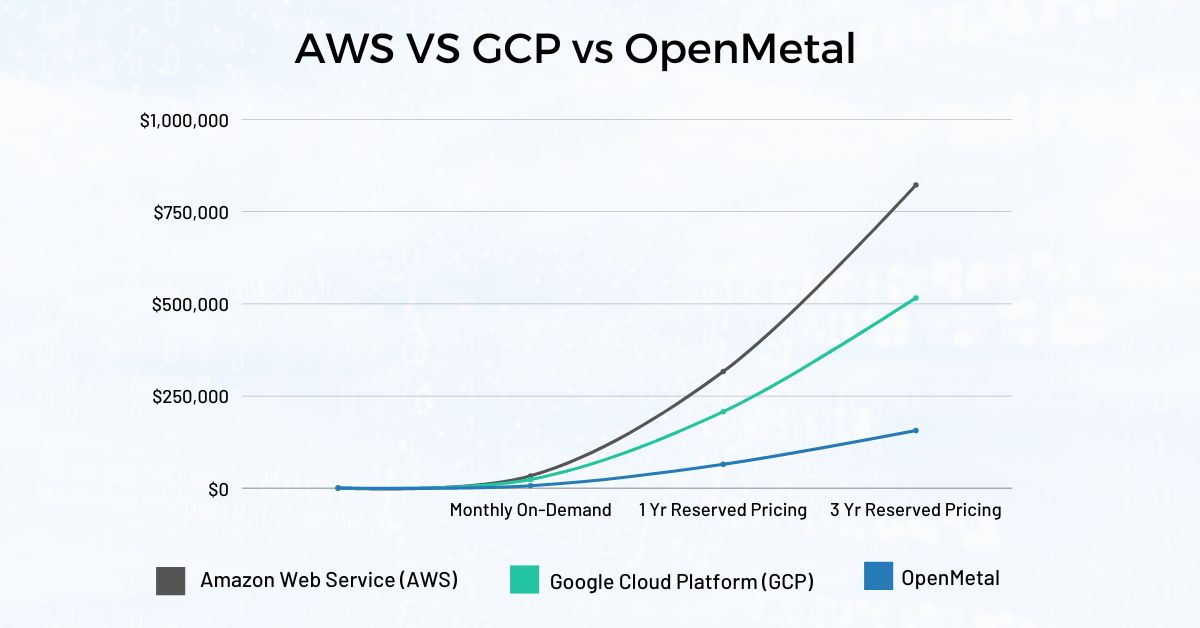
^All prices are estimates only and may be subject to change because of pricing adjustments and/or unique customer resources. Pricing obtained June 2023.
*Config summary: Tenancy (Shared Instances), Operating System/Software: Free, Number of instances: 593, Provisioning Model: Regular, GCP instance (E2-medium), Committed Use Discounts applied, Internet Egress (Standard Tier: 36,000 GiB), Persistent Disk (Accompanying): Zonal SSD PD 40 GiB), Northern Virginia
Amazon Web Services (AWS) and Google Cloud Platform (GCP) have established themselves as industry leaders in the cloud computing landscape. With their ability to provide a wide range of services to meet diverse business needs, on demand, and a low entry point make them enticing solutions for many organizations.
But how do you choose which one is best for your organization? As you navigate the decision making process, it’s essential to understand the comparative strengths of these platforms, pain points their customers experience, and explore alternative solutions. If you’re like most organizations, infrastructure accounts for a significant portion of your expenses so let’s make sure you are getting the most out of your money.
If you ever have to compare products and shop around for cloud across the various vendors, I feel your pain. The products have different names, it’s probably fair to say that 20 VMs have the same specs but are on different hardware types so the prices are different. No one gives you the option to just fill in everything, say what VM size (RAM and vCPUs), OS, bandwidth, storage, etc. you’re looking for all at once to make sure you’re comparing the exact product. Some even require that you add bandwidth pricing after VMs. Things are broken up and if you do not know everything you will use to add them to your quote you will quickly find yourself with a very misleading quote. I honestly think that some cloud providers can do a better job at providing transparent pricing but that topic can be a entire blog on its own.
I was curious and wanted to see how OpenMetal measured up to the competitors in terms of pricing and willingly (one may even argue foolishly) decided to do a pricing comparison. It took several attempts to make sure I got everything included (bandwidth and persistent storage). After navigating the complex maze of public cloud pricing I felt the need to share my findings to help anyone else stumbling around attempting to shop around amongst cloud providers.
How Much Do They Cost?
Let’s start with expenses, since this is where my analysis began. The virtual machines I selected are just one of a multitude of options, they may not be the best for your use case. If you use or are planning to use a different virtual machine from either provider you can reach out to our cloud consultants for a complimentary, no commitment price comparison.
For this comparison, I looked at AWS EC2 t3.medium vs GCP E2-Medium. These VMs come with 2 vCPUs, and 4 GiB of memory. I compared pricing for 68 VMs and elected have 40 GiB per VM (SSD persistent disk) so 2,720 GiB total and 9 TB total bandwidth for egress. The quotes were also from data centers in Virginia for each provider below. Note the cost difference on an individual VM may be insignificant to most organizations but as workloads grow those pennies add up quickly.
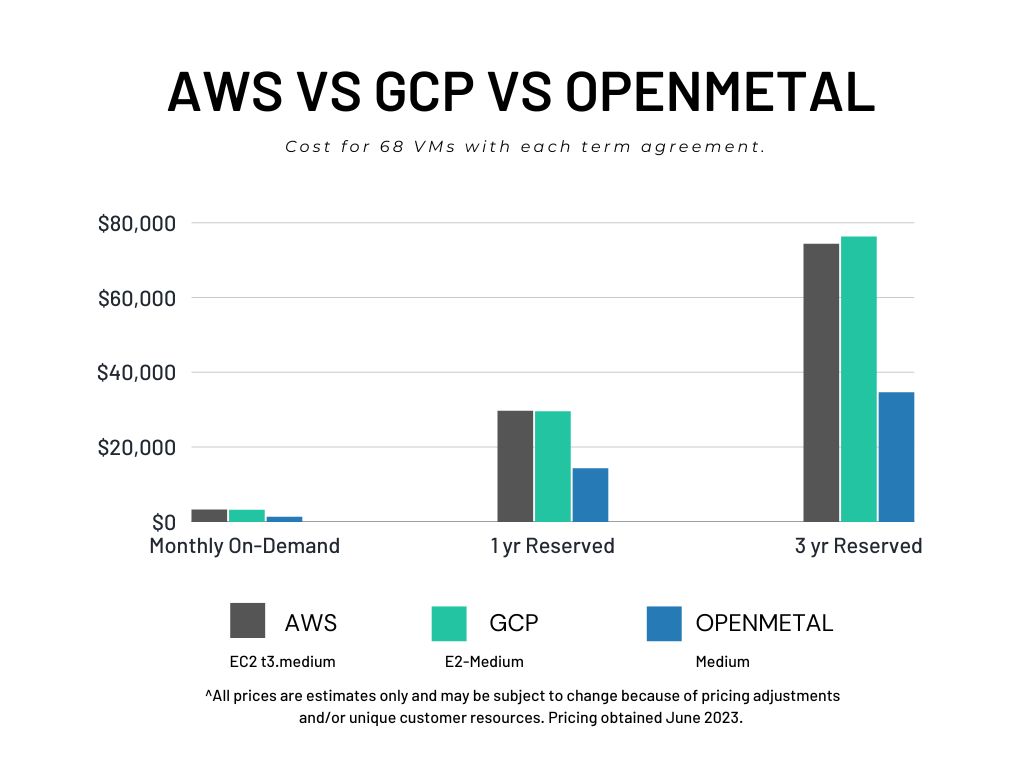
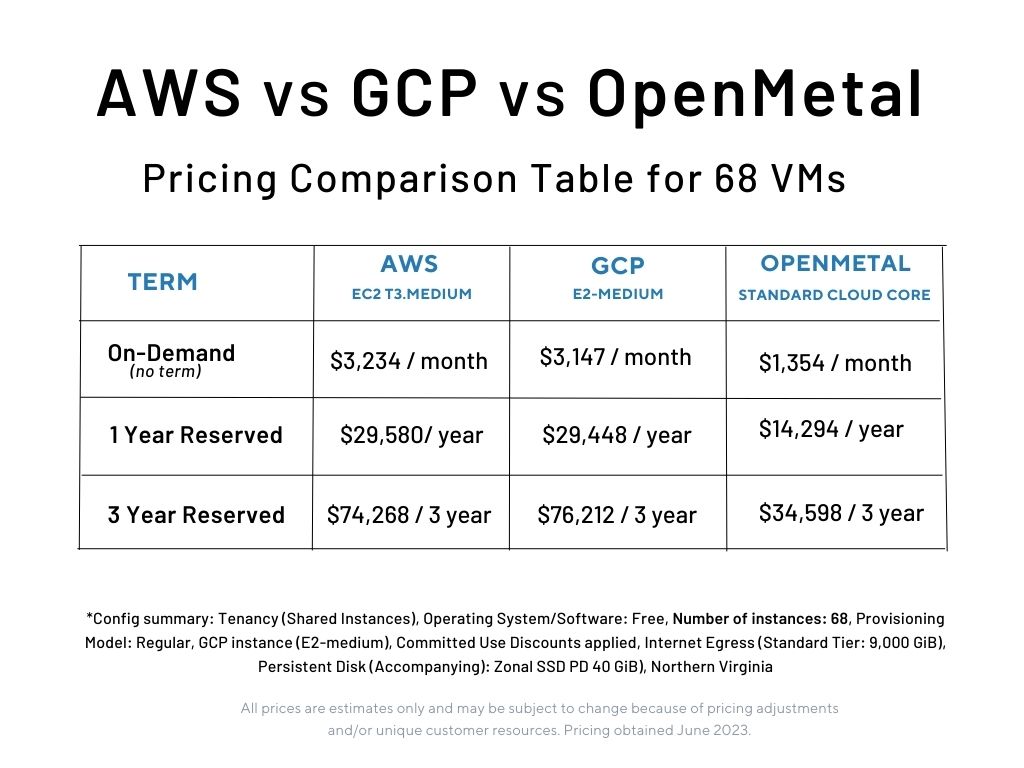
^All prices are estimates only and may be subject to change because of pricing adjustments and/or unique customer resources. Pricing obtained June 2023.
*Config summary: Tenancy (Shared Instances), Operating System/Software: Free, Number of instances: 68, Provisioning Model: Regular, GCP instance (E2-medium), Committed Use Discounts applied, Internet Egress (Standard Tier: 9,000 GiB), Persistent Disk (Accompanying): Zonal SSD PD 40 GiB), Northern Virginia
Here you can see that AWS and GCP offer similar pricing and fall into the allusion that in terms of cost it doesn’t matter which provider you choose. It’s important to keep in mind that your workloads will grow and to avoid migration costs later on, you want to make sure that you are getting the best deal now and in the long run. Here you can see that OpenMetal is roughly 50% less expensive than AWS and GCP but let’s see how these cloud providers compare in the long run when your workload grows.
Costs as Workloads Grow
Let’s take things one step further and see if these savings continue as your workloads grow. For this next table I look at 593 VMs with 36TB egress, and 94,880 GiB SSD persistent disk (160 GiB per VM).
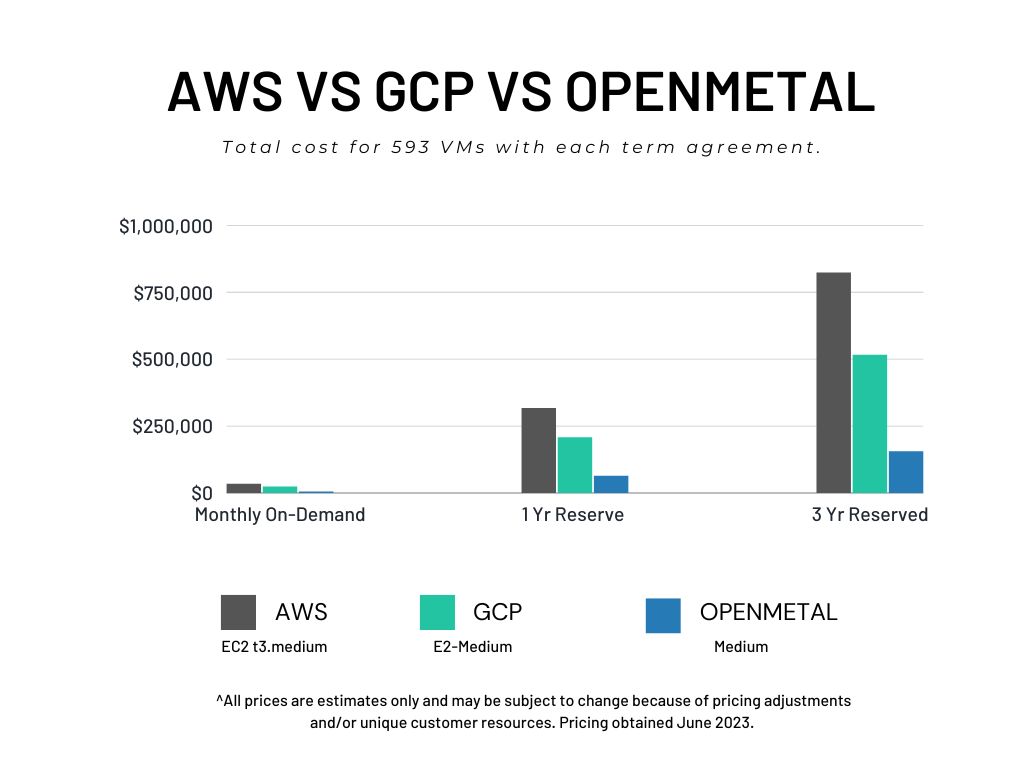

^All prices are estimates only and may be subject to change because of pricing adjustments and/or unique customer resources. Pricing obtained June 2023.
*Config summary: Tenancy (Shared Instances), Operating System/Software: Free, Number of instances: 593, Provisioning Model: Regular, GCP instance (E2-medium), Committed Use Discounts applied, Internet Egress (Standard Tier: 36,000 GiB), Persistent Disk (Accompanying): Zonal SSD PD 40 GiB), Northern Virginia
Now looking at the three year term after all discounts, AWS stands out as clearly being the most expensive option. When compared to AWS, you would save $306,216 with GCP and $666,073 with OpenMetal.
But cost isn’t everything, after all do you get what you pay for? There’s a different level of service and quality of product when you splurge for designer vs bargain brands, so let’s look at the other aspects of these products. Is AWS worth spending almost $300,000+ more on VMs than competitors? Let’s find out.
Comparing AWS, GCP, and OpenMetal Features and Services
AWS has an extensive suite of services, offering a range of options for businesses.
GCP, on the other hand, is rapidly catching up, continually expanding its service catalog to cater to businesses of all sizes.
OpenMetal clouds are built with OpenStack and backed Ceph. Being an open source cloud means that you have a multitude of free tools and services you can implement within your cloud.
Support
 All three providers offer excellent support options. AWS boasts a larger support team, while GCP’s support team is regarded as highly responsive. It is important to note that despite their large teams and support packages, there are many customer complaints about long wait times for support tickets to be responded to. And sometimes when users do receive a response it is not helpful.
All three providers offer excellent support options. AWS boasts a larger support team, while GCP’s support team is regarded as highly responsive. It is important to note that despite their large teams and support packages, there are many customer complaints about long wait times for support tickets to be responded to. And sometimes when users do receive a response it is not helpful.
OpenMetal’s support team is made up entirely of engineers (no customer service reps or interns) and every customer has direct access to their very own Tier 3 OpenStack cloud engineer via Slack. Additionally, because OpenMetal cloud cores are private and belong entirely to one user we can immediately implement changes needed to improve your cloud experience without having to consider the experience of other customers. All OpenMetal clouds include support for hardware issues, OpenMetal is 100% responsible for the anything hardware related including updating your OpenStack and Ceph software. If your team will need some assistance in running the cloud itself you can bundle in an Assisted Management Support Package. Support pricing varies across providers and it’s too much to cover in this blog, but I will create a follow up blog comparing support packages services and pricing across providers soon.
 Security
Security
Security is a paramount concern in the cloud environment, you need to protect your code and your data. Many users gravitate to public cloud for this reason, because they trust in the cloud experts to know how to keep their data clean. While using an OpenStack cloud from a hosted private cloud provider like OpenMetal gives you full control of securing your cloud, it can be difficult depending on your team’s skill level. Both AWS and GCP prioritize security, but like all systems they’re not invulnerable. According to the New York Times, last year it was discovered that a former AWS engineer used her knowledge to exploit vulnerabilities in Capital One’s servers and access over 100,000 customers’ data and even used the servers to mine for crypto currency. While it can be reassuring to have a large team working on the security of your cloud, it can also be a vulnerability.
Additionally, when using proprietary clouds you may not have the access needed to audit the firewalls, and configurations needed to keep your cloud secure. There’s been a number of cases where hackers exploited misconfigurations to gain access to clouds. Regardless of who your cloud provider is, it is imperative that you implement additional security measures to protect your data.
Community
AWS has a well-established and thriving community, providing a wealth of resources, including tutorials, documentation, and support forums.
GCP’s community is growing, it has already fostered a large and active user base that can provide valuable insights and assistance.
OpenMetal delivers unaltered OpenStack so you can easily tap into the large and buzzing open source community.
Unfortunately, AWS just does not provide enough bang for your buck that you should be willing to pay close to that much more for their services. Unless, of course, you have cloud needs in multiple countries and their global reach is the only one that fits your needs. But in a world where hybrid clouds are increasingly becoming popular, I would say it may be more cost effective to use multiple cloud providers in that instance.
What sets OpenMetal apart from public cloud?
OpenMetal offers instant availability of computing resources, similar to public clouds. However, OpenMetal distinguishes itself through the private nature of its cloud cores. Each hyper-converged cloud core, comprised of three servers, is exclusively allocated to a single tenant.
As a tenant, you enjoy root level access to your dedicated cloud, empowering you to fine-tune both hardware and software according to your precise requirements. With OpenMetal, you have full authority over your infrastructure, granting you the freedom to implement custom security measures as per your preference.
Currently, OpenMetal clouds are running on OpenStack Yoga and Ceph Quincy. All OpenStack and Ceph updates as well as hardware management is handled by the OpenMetal engineering team.
AWS vs GCP vs OpenMetal Recap
Amazon Web Service
Pros:
-Global Reach.
-Wide Ranges of Services.
-Security.
Cons:
-Cost, not only is AWS expensive but the billing structure can be confusing.
-Complexity, it can be difficult to get started on AWS without engineers trained to use the platform.
OpenMetal
Pros:
-Pricing, significantly lower than mega cloud providers.
-Control, root level access to configure your cloud.
-Support, direct access to OpenStack Engineers.
Cons
-Higher starting cost.
-Complexity, better suited for teams with OpenStack training.
Google Cloud Platform
Pros:
-Innovation.
-Performance, GCP services are designed to deliver high levels of performance and reliability.
-Pricing, lower prices than AWS.
Cons:
-Limited market share.
-Complexity, GCP can be complex to use, especially for businesses that are new to cloud computing.
While AWS and GCP have secured their position on the cloud front, we’re not paying extra for names and reputation. We’re looking at product performance and support. And after careful examination, I’m not convinced that AWS and GCP provide sufficient additional value to justify their significantly higher price tag.
But you don’t have to take my word for it! Experience the power, performance and efficiency of an OpenMetal On-Demand OpenStack Cloud for yourself.
AWS Alternatives
For a more detailed layout of exploring OpenMetal Cloud Cores as an alternative to AWS, visit our AWS Alternatives page. There you can look at various comparisons based on budget size, VM specs, and customer stories.
Google Cloud Alternatives
For a more detailed layout of exploring OpenMetal Cloud Cores as an alternative to GCP, visit our Google Cloud Alternatives page. There you can look at various comparisons based on budget size, VM specs, and customer stories.
More on the OpenMetal Blog…
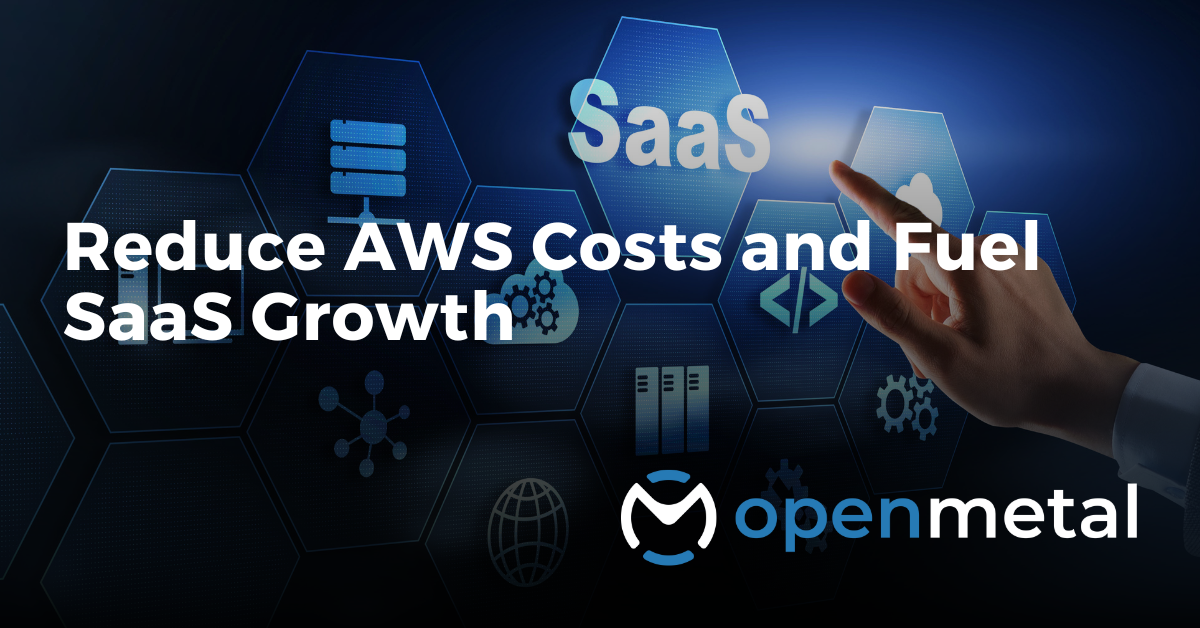
Reduce AWS Costs and Fuel SaaS Growth
When SaaS providers consume large amounts of public cloud, a move to a hosted private cloud may reduce current AWS costs up to 50%. This can…Read More
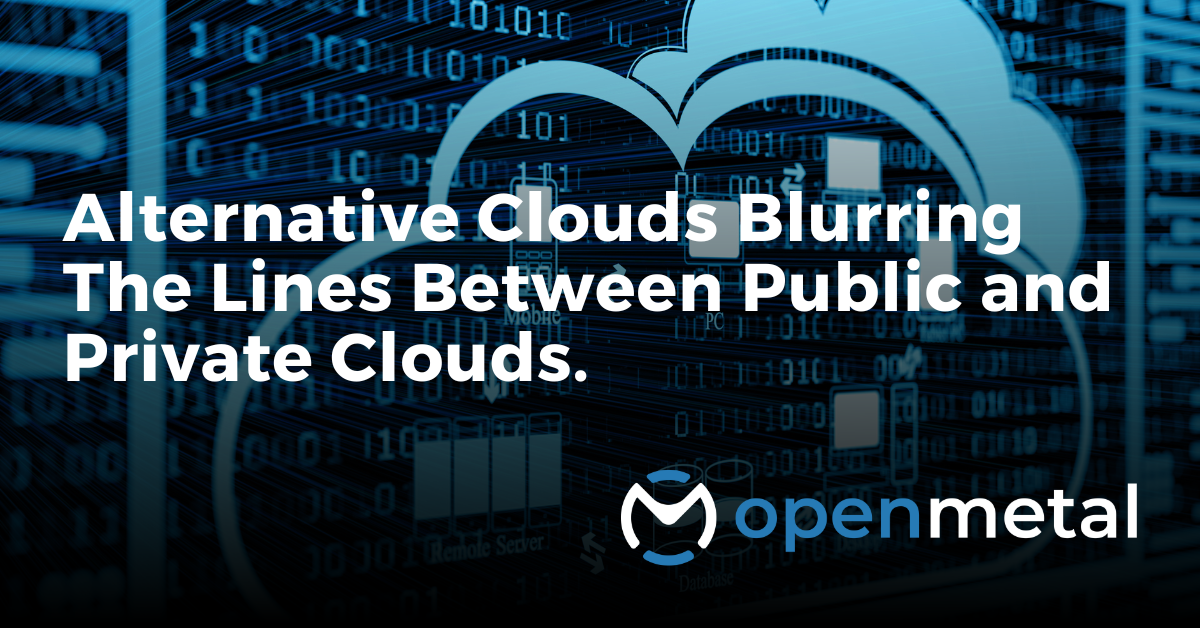
Alternative Clouds Blurring The Lines Between Public and Private Clouds
Learn about alternative cloud solutions that combine the best of both public and private clouds and give your business greater flexibility…Read More
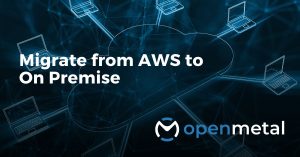
Migrate From AWS to On Premise
Ready to explore the advantages of on-premise clouds alongside Todd Robinson, the President of OpenMetal? Under his guidance, delve into the details and acquire valuable insights on establishing your very own on-pre…Read More
Test Drive
For eligible organizations, individuals, and Open Source Partners, Private Cloud Cores are free to trial. Apply today to qualify.
Subscribe
Join our community! Subscribe to our newsletter to get the latest company news, product releases, updates from partners, and more.




































 Security
Security